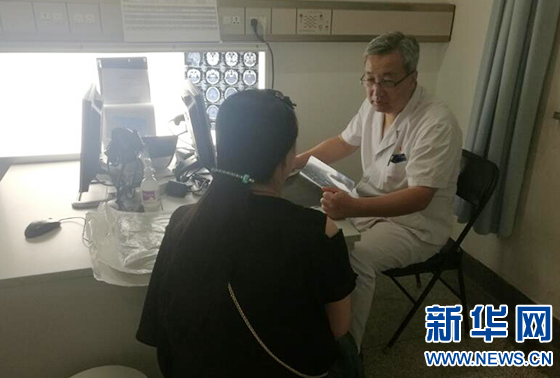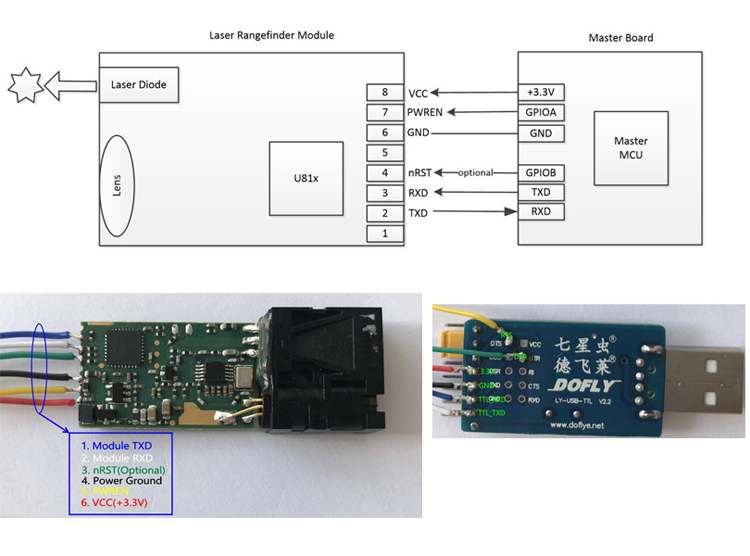When you mention a brain tumor, many people will think of craniotomy and the long scar on the head... Recently, the Beijing Hospital Authority launched the “Meeting Guardian†doctor-patient experience activity and entered the capital medical department known as neuroscience. University Xuanwu Hospital, the zero-distance feeling of the hospital's neurosurgical tumor area director Xu Geng's "first class." Xu Geng, director of the Department of Neurosurgery and Tumor, Xuanwu Hospital, Capital Medical University, communicates with patients A small "sunroof" on the head can remove the meningioma At 8:30 in the morning, Xu Geng went to the outpatient building to receive the first patient. Before that, he actually completed a round of rounds. The 40-year-old female patient has a meningioma. Xu Geng after reading the patient's imaging test and asking the patient for some of the most recent symptoms, it is recommended that the patient undergo surgery as soon as possible. "What is the success rate of surgery? Besides surgery, are there other treatments?" The patient asked a lot of questions. Xu Geng said that surgery is the first choice for benign or malignant tumors. Some conflicts and fears. In fact, with the continuous advancement of medical technology, especially minimally invasive technology, craniotomy is not as terrible as everyone thinks. The doctor will first find the lesion, and then choose the location closest to the tumor and less damaged, without damaging the structure. In the case, open a small "skylight", take the tumor out, and then suture. Xu Geng said that meningiomas are common in the clinic, about 95% are benign tumors, meningioma is generally more common in women, the study found that may be related to estrogen, women and men are about 3:1, benign tumors in different parts, The difficulty of surgery is also different. The 6-year recurrence rate of meningioma performed by Xuanwu Hospital is relatively low, and some even have no recurrence for several decades. The reason is mainly related to the range of tumor growth, the method of doctor's cutting, etc. The operation should be completed without damaging the surrounding normal structure. The patient recovered basically after surgery. Glioma is a common benign tumor in neurosurgery that can be recovered by surgery As a hospital and research center focusing on the clinical and research of neuroscience and geriatrics, the patients and family members who came to see the doctor came from all over the country. After about two hours of outpatient service, most of the patients were meningioma and glial. Tumor patients, Xu Geng said that the common diseases of neurosurgery include glioma, meningioma, metastases, pituitary tumors (endocrine tumors), congenital tumors, lymphomas and so on. Among them, glioma is the most common, accounting for about 40%-60% of the intracranial. Glioma is divided into benign, benign and malignant tumors according to different grades, while the degree of malignancy is divided into 4 grades, and the grade is benign. The second grade is benign, and the third and fourth grades are malignant. Xu Geng said that with the advancement of science, there are more and more problems to be solved. At present, glioma is still a hot spot of research, both internationally and domestically. The degree of malignancy (grade) of stromal tumors has a greater impact on the survival of postoperative patients. If some patients have a survival period of one to two months after surgery, some patients will have a long survival period after surgery. Mr. He, a patient from Shaanxi, was 43 years old. He was reviewed 14 years after glioma surgery. No MMR (magnetic resonance imaging) examination showed no tumor recurrence. Mr. He said that he had been in the hospital for review for 14 years, there was no uncomfortable phenomenon, and the traces of the operation were not easy to see. Xu Geng said that different grades of gliomas require different treatment options. Generally, benign gliomas can be restored to normal condition by surgery. At present, the treatment of malignant tumors can not achieve complete recovery, but doctors will consider before surgery. After surgery, the patient's neurological function is at least not lower than the preoperative condition, and strives to be close to the healthy population in daily life. "Diagnosis of brain tumors requires consideration of multiple factors. Patients who come to see a doctor have MRI (magnetic resonance imaging), CT examination, etc." Xu Geng said that imaging has provided a good help for the discovery of tumors. It also brings convenience to the design of the operation. Neurosurgeons must have "wisdom + understanding + spirituality" Founded in 1958, Xuanwu Hospital of Capital Medical University is a three-level general hospital that undertakes medical, educational, scientific research, prevention, health care and rehabilitation tasks. While doing the first-line treatment work, Xu Geng also undertook the clinical teaching work of the graduate students of Capital Medical University and the clinical teaching guidance of the doctors who came to the hospital. On the same day, he provided treatment advice to the patients while explaining the symptoms and solutions to the students. method. According to reports, Xu Geng was promoted to the position of deputy chief physician and has been the director of the neurological tumor area. He has been engaged in neurosurgery for 28 years, completed more than 1,500 emergency operations, and performed more than 3,000 elective operations. In the functional area tumor surgery and insular glioma have unique insights, the first in the country to complete the total tumor resection of the functional area and retain nerve function, early application of basic research results in clinical and achieved good results (island gum Tumor surgery is a typical representative), not only to preserve the pre-operative neurological function but also to restore some of the nerve function lost before surgery, and the survival of patients after surgery is significantly prolonged. "Surgical skills for extracranial lesions in intracranial surgery require surgical skills. No matter how deep or shallow, skills are needed. Intracranial intracranial surgery relies on wisdom, the process of judgment and tumor degeneration, both The brain damage is the smallest, the function remains the best, and the tumor is cut the most. The cut is good, which determines the patient's survival." Xu Geng has always stressed that a neurosurgeon needs two conditions, the first Have savvy, others can do it, you can realize it, others can do it well, you can see it and understand it. Second, you must have spirituality, creativity, and practicality. By using existing knowledge, On the basis of the original technical methods, using your own thinking to temper and solve, can continue to progress. Small details in everyday life cannot be ignored "There are tumor cells produced in the human body at any time, so it is very important to develop good living habits in daily life." Xu Geng said that the treatment of tumors is still early detection and early treatment, and the public can take a CT in the annual physical examination. Or do a nuclear magnetic resonance examination, etc., found that benign tumors need to go to the hospital for timely treatment. Xu Geng reminded that the cause of brain tumors is unknown, but the daily details can not be ignored. If your vision suddenly deteriorates, your elbows become inflexible, your epileptic seizures, your memory is diminished, your hearing loss is accompanied by tinnitus, etc. If any symptoms are gradually aggravated and continue to occur, you need to consider whether there is a brain tumor. Source: Xinhua News Agency
New product of U85 micro laser distance sensors use highly focused class 2 laser to detect objects or measure distances, and can return a measured value via varieties intface( serial, usb, rs232, rs485, bluetooth etc.). The electronic distance sensor is a very small Laser Distance Sensor, but high resolution up to 1mm and long distance measuring sensor - teachable measuring range of up to 30m. Extremely accurate distance sensing sensors, errors down to ± 1mm. And the mini sensors and measurements support continuous measurement function, great for compact solutions(eg: robots) with the smallest Laser Distance Sensor of the world!
Parameters of U85:
Accuracy
±1 mm (0.04 inch)
Measuring Unit
mm
Measuring Range (without Reflection)
0.03-20m/0.03-30m
Measuring Time
0.1~3 seconds
Laser Class
Class II
Laser Type
620nm-690nm, <1mW
Size
41*17*7mm (±1 mm)
Weight
About 4g
Voltage
DC2.0~3V
Electrical Level
TTL/CMOS
Certifications
CTNT, FDA, CE, FCC, RoHS, etc.
Operating Temperature
0-40 ℃ (32-104 ℉ )
Storage Temperature
-25~60 ℃ (-13~140 ℉)
Mini Laser Distance Sensor,Optical Laser Distance Sensor,Smallest Laser Range Sonsor,Laser Measuring Sensor Chengdu JRT Meter Technology Co., Ltd , https://www.irdistancesensor.com
